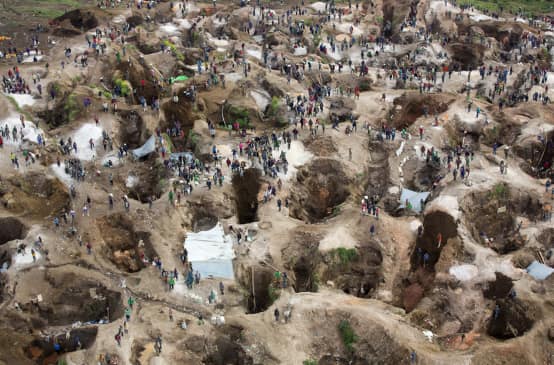Completed campaign
Stop Lufthansa's Agrofuel Plans
In order to increase their ‘energy security’, Lufthansa wants to burn kerosene with agrofuels. At the end of two years of tests, up to 10% agrofuels are to be added to jet fuel. Lufthansa likes to speak about algae – not a realistic option – and jatropha, which is linked to land-grabbing, hunger and deforestation. Please call on Lufthansa to drop their agrofuel plans.
Lufthansa is one of the largest and most profitable civil aviation companies. The airline wants to further strengthen their position and maximise their profits. Lufthansa has announced a two-year test phase with agrofuels and is one of the first airlines to make such an announcement. By 2020, up to 10% of jet fuel is to come from agrofuels. With current fuel use of 7.7 billion tonnes a year, the company would need up to 770,000 tonnes of agrofuels per year – that’s without Lufthansa’s planned growth.
The reasons for Lufthansa’s plans are economic ones: jet fuel is responsible for 15% of the airline’s costs and this proportion will grow if oil prices rise. The company sees agrofuels as an affordable and long-term secure alternative, and they also hope to profit from carbon trading by using them.
From 2012, onwards, aviation will be included in the European Emissions Trading Scheme. The current 24 million tonnes of carbon dioxide emissions (with other warming impacts being officially ignored) will be a liability for Lufthansa. The company estimates that they might have to pay 150-350 million Euros per year. Under the rules of the EU Emissions Trading Scheme, all biofuels are classed as ‘carbon neutral’, provided that they meet the flawed minimum ‘sustainability standards’ in the EU. Blending of agrofuels thus, on paper, improves companies’ CO2 balance and will save expenses.
The global climate, however, will not benefit from such false accounting. Lufthansa states that the precondition for their use of agrofuels is that they must be suitable for aircraft and available in sufficient quantities at an acceptable cost. Furthermore, the airline’s 2010 Sustainability Report states: “Lufthansa puts great importance on ensuring that alternative fuels do not compete with food production and that they deliver proven benefits for the environment.”
This, however, is exactly the problem with agrofuels. Lufthansa does not say how they plan to fulfil those promises. The company speaks of hope for algae and so-called energy crops like jatropha. Algal biofuels, however, are still at an early research and development stage, energy-inputs, water use and potential impacts of genetically engineered algae are of concern, and even Lufthansa states that “during the next ten years, no sizeable amount of agrofuels can be expected from this feedstock”. The tropical ‘miracle bush’ jatropha does not, in reality, yield much oil on poor soils. It only thrives on fertile soils and with irrigation or plentiful rains, though even then, crop failures have been reported. This sets jatropha against food production.
Furthermore, a scientific study has shown that one litre of jatropha oil requires 20,000 litres of water during cultivation. Natural ecosystems are being destroyed, either directly or indirectly, amongst them highly biodiverse and carbon-rich savannah. Ecosystem conversion into monocultures destroys biodiversity and also fuels global warming through the release of massive quantities of carbon from vegetation and soils.
Please support our email action “Stop Lufthansa’s Agrofuel Plans”.Deutsche Lufthansa AG
Wolfgang Mayrhuber, Chairman and Chief Executive Officer
Fax: +49 69 / 696 – 95428, E-mail wolfgang.mayrhuber@dlh.de
Dear Mr Mayrhuber,
I welcome Lufthansa’s efforts to reduce kerosene consumption and cut greenhouse gas emissions, which is reported in our latest Sustainability Report. Burning agrofuels, however, puts Lufthansa on the wrong path in my opinion.
Agrofuel production has been subject to major critique for several years, due to the catastrophic impacts on people, environment and climate. You appear to be aware of those problems when saying: : “Lufthansa puts great importance on ensuring that alternative fuels do not compete with food production and that they deliver proven benefits for the environment.”
You have not, however, answered the question of how to fulfil these aims. The Lufthansa Sustainability Report 2010 calls algae and so-called energy crops like jatropha “bearers of hope’”. Even Lufthansa describes algae as a long-term project, since over the next ten years, no commercial quantities of algal biofuels can be expected.
This leaves jatropha, which bears some of the responsibility for the ongoing destruction of tropical ecosystems. The tropical jatropha shrub is being planted on a large scale in Africa (Kenya, Tanzania, Mozambique, Swaziland) and in India – with catastrophic effects. The local population is being evicted in order to establish plantations or has to work for the new land owners, planting jatropha for tiny wages.
Jatropha is already being planted on a large scale by European investors in Africa and India – with catastrophic impacts for nature and the people living in those areas. Jatropha is supposed to be an ‘easy’ plant, which can reach yields on poor soils. In reality, however, this has not been the case. Commercial yields can only be reached on fertile soils and with irrigation. This puts jatropha into direct competition with food production, something that you have said you want to avoid. The water requirement for growing jatropha is enormous, too. According to a scientific study, one litre of biofuels from jatropha require 20,000 litres of water during cultivation.
Furthermore, it is not true that biofuels release no CO2 other than what the plants had previously absorbed for their growth. Cultivation, fertilisers, irrigation, harvests, transport, storage and refining of agrofuels all require significant amounts of energy and this needs to be added to the CO2 balance.
In order to establish agrofuel plantations, natural ecosystems are, directly or indirectly, destroyed. In the case of jatropha, those are in particular very biodiverse and carbon rich savannah areas. The conversion of those ecosystems to agrofuel plantations destroys biodiversity and fuels climate change through the massive release of carbon from vegetation and soils. If those CO2 disasters are fully included in the calculations, the CO2 balance of agrofuels is catastrophic. There can be no talk of a “closed ecological cycle”.
The use of agrofuels therefore does not agree with a responsible environmental and business strategy. I would therefore ask you to end the two-year long test series and to abandon Lufthansa’s plans for up to 10% agrofuel blends.
Yours sincerely,

